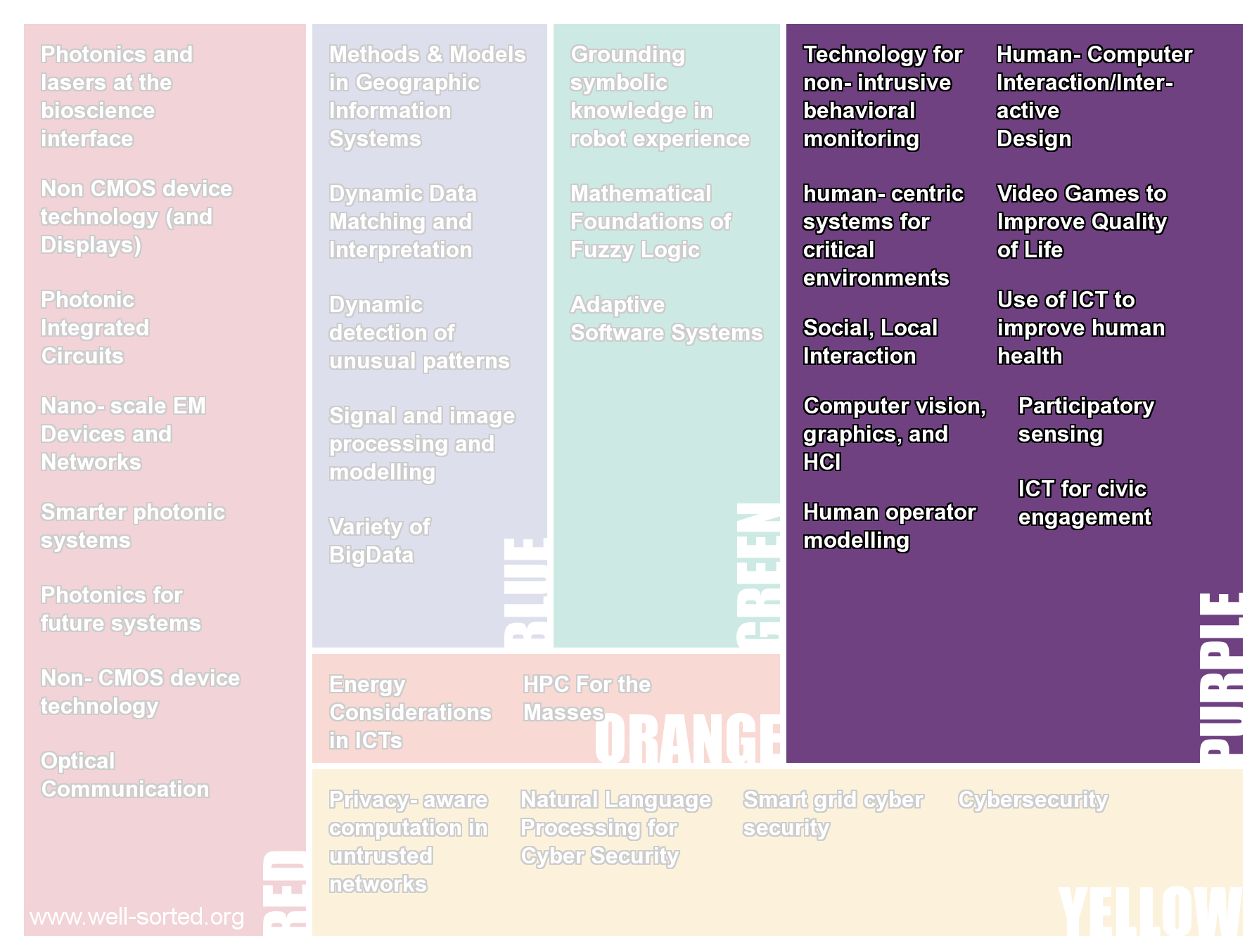ICT Early Career Researcher Workshop, Glasgow 2014
February 2014
EPSRC’s Information and Communication Technologies (ICT) Theme held this workshop as part of its on-going commitment to support the development of early career researchers.
The two-day workshop provided a forum for early career researchers from across the ICT research landscape to engage with academic mentors, guest speakers and EPSRC staff. Workshop sessions provided advice on funding opportunities and career development, networking activities and discussions on the impact of ICT research, responsible innovation and the development of strategies to benefit UK ICT research.
Prior to the workshop, participants were invited to provide a short title and longer description answering the question:
"Which research topic in ICT is currently of greatest interest to you?"
Participants were then invited to sort the resulting topics into coherent groups. These groups are shown below, with the colours used to refer to them at the meeting. To see the longer descriptions for any coloured area, or the researchers who were interested in the topics within, simply click on it.
Purple Groups:
'ICT4U' and 'Human-Centered ICT'
| Group Members | Description |
|---|---|
| Participatory sensing | ICT enabled policy modelling and urban governance of Smart cities |
| Social, Local Interaction | Mobile interaction has lead to an increase of geo-tagged social media. In the context of Smart Cities, how can we best reintegrate media back into the location of its creation, in a way that informs both visitors and tourists about a place. |
| ICT for civic engagement | Exploring how ICTs can be used in engaging members of the public in political discourse and with the running of their own communities. For example, this might include the use of technologies that lower barriers to participation and involve excluded groups |
| Video Games to Improve Quality of Life | I am interested in the design and application of interactive technologies such as video games to improve the quality of life of persons with special needs, e.g., older adults in long-term care or persons with disabilities. |
| Use of ICT to improve human health | ICT technologies are changing our society at an incredibly high pace. The ageing population poses huge challenges on our current living standards. ICT is a key element to ensure a high quality of life for ageing individuals and their social integration. |
| Technology for non-intrusive behavioral monitoring | Recent research shows the importance of behavioural monitoring particularly for ageing population. What are the suitable ICT for non-intrusive behavioural monitoring and discriminating the abnormal behaviours? |
| Human operator modelling | Investigating the role of feedback loops in interactive systems, using a control-theoretic approach to modelling the interaction between the human and the device. |
| Human-Computer Interaction/Interactive Design | Human-Computer Interaction, cognitive ergonomics and development of quantitative and qualitative research methodologies for examination of interaction with innovative technologies in complex systems. |
| Computer vision, graphics, and HCI | My research focus on interactive graphics and human computer interaction, especially on intuitive exploration of data. My long term goals is to apply Internet-scale data processing to computer graphics and human computer interaction. |
| human-centric systems for critical environments | Human expertise, know-how and specialised cognitive skills are attributes that are very highly valued in critical environments (e.g. in manufacturing, healthcare). Via new advanced ICT technologies such traits can be an integral part of complex systems. |
Breakout Group 1:
Coloured names have a link to the attendee's webpage
Kathrin Gerling
Moi Hoon Yap
Adelaide Marzano
Kwang In Kim
Javier Escudero
Zaheer Khan
Nick Taylor
Nanlin Jin
Gerrit Niezen
Breakout Group 2:
Coloured names have a link to the attendee's webpage
Julie R. Williamson
Brian Murphy
David McGookin
Martin Halvey
George Panoutsos
Baharak Rastegari
Anya Skatova

